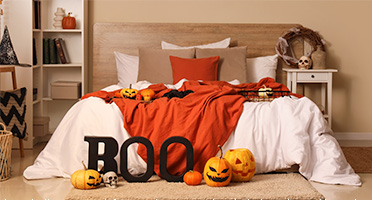Don’t Let Sleep Apnea Haunt You: Spooky Signs You Shouldn’t Ignore
Is your home a haunted house every night? Do nighttime disturbances abound? Are there eerie noises that echo through dark corridors? If so, you may have sleep apnea. Let’s take a look at a few spooky symptoms that can alert you to this nighttime menace, and discuss what you can do about them.

Spooky symptoms that indicate sleep apnea
Sleep apnea can sneak up on you like a band of kids out trick-or-treating. You may not realize that you have sleep apnea at first, but over time, the symptoms will become hard to ignore. If you suspect that you have sleep apnea but you aren’t sure, consider ordering a sleep test to find out. Here are some of the symptoms that can haunt you at night and alert you to this sleep disorder:
- Gasping for air: When you wake suddenly, feeling like you’re suffocating, like a ghostly hand is clutching your throat. If you have sleep apnea, the soft tissue in the back of your mouth and throat can close and block the passage of air. When you move to breathe again, you may wake up gasping. This blockage is subtle at first; you may not even realize it is happening.
- Choking sounds: When you make startling, ghastly noises in the night that leave your spouse wide-eyed and terrified. Along with gasping, it is common to make snorting or choking sounds when attempting to get air after an apnea.
- Loud, monstrous snoring: This is not your average snore, but a bone-rattling racket that could wake the dead. Snoring is caused when the soft palate, tonsils, uvula, and tongue relax and the airway narrows.
- Silent pauses in breathing: These are eerie moments when your breathing stops, as if you’ve vanished into thin air like a ghostly apparition. When the snoring stops, the silence can be as startling to your family as the constant noise.
- Creaking of floorboards: Sleep apnea can cause you to go to the bathroom several times a night, making floorboards creak as you creep to and from the bathroom. Sleep apnea causes frequent and brief awakenings that can be enough to bring you to consciousness and make you aware that your bladder is full.
- Bumps in the night: Sometimes, on the way to the bathroom, you may be so tired that you bump into things.
- Night sweats: This is when you wake up drenched, as if you’ve just escaped a haunted nightmare. Sleep apnea can cause you to heat up due to the triggering of the fight-or-flight response. Your body responds to the extra heat by sweating.
- Morning headaches: This is a lingering curse that can haunt you long after you rise. The likely cause of these headaches is hypercapnia (also known as hypercarbia), which is a buildup of CO2 in the bloodstream.
- Daytime sleepiness: This is when you feel like a zombie and shuffle through your day in a fog. Good sleep is essential for daytime brain function.
Are you experiencing these symptoms? If so, start your journey back to health by ordering a sleep test, scheduling a sleep study, or speaking with a professional about your symptoms.
The real-life terrors of untreated sleep apnea
Ignoring these spooky signs isn’t just scary, it’s dangerous! Untreated sleep apnea can unleash a host of health horrors. Here are just a few health issues to consider:
- Heart disease
- High blood pressure
- Diabetes
- Memory problems
- Mood changes
- Increased risk of accidents
You don’t have to fear sleep apnea or the long-term medical complications that come with it. There are ways of treating this sleep disorder to mitigate the symptoms.
Steps you can take right now
You have it in your power to start getting rid of the symptoms that haunt your house. Here are some steps you can take to try to get better sleep at night:
- Lose weight to reduce the frequency of apneas.
- Sleep on your side or belly.
- Create a dark sleep environment.
- Prepare your body for bed by unplugging electronics.
- Prepare your body to enter sleep by keeping your bedroom cool.
- Take a lukewarm shower before going to bed.
- Read a good book before bed.
There are many ways you can improve sleep and counteract the symptoms of sleep apnea on your own, but it is important to consider the ways a medical professional can help.
Don’t be haunted. Take action
If you’re battling the symptoms of sleep apnea this Halloween season, don’t wait for a full moon to seek help. Talk to your doctor or a sleep specialist. With the right treatment, you can banish sleep apnea and reclaim peaceful, restful nights - no exorcism required!


June is Men’s Health Month—a time to raise awareness about the serious health risks men face. On average, men live five years less than women, partly due to higher rates of heart disease, cancer, diabetes, and mental health issues. As caregivers and providers, men often overlook their own health. This month, we’re highlighting one often-missed concern: sleep apnea.




